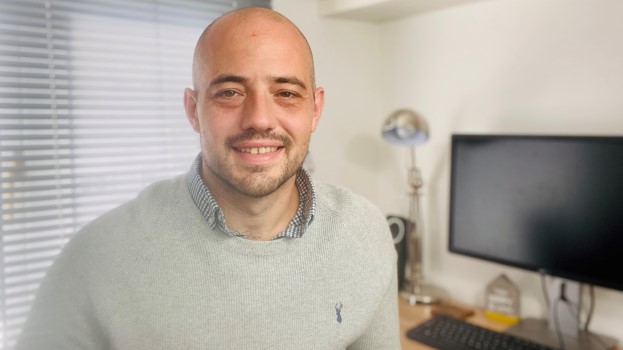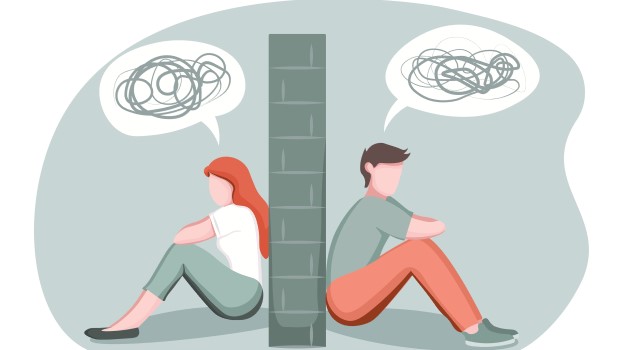Former railway worker Andy Baines-Vosper (pictured) now works for Samaritans. He shares his experiences of suffering from depression, anxiety and burnout, and ideas for if you have your own mental health and wellbeing challenges.

Hi Andy, we saw you at Rail Wellbeing Live last year talking about your Beneath the Hard Hat project inspiring people to get help for mental wellbeing. What’s next?
Unfortunately, I paused Beneath the Hard Hat at the end of last year after I was made redundant. Redundancy is difficult at any time. It was especially challenging during the pandemic and the build-up to Christmas, so I took time out to focus on myself and next steps.
Since February, I’ve been working for Samaritans as training delivery manager, and that’s my focus.
How is it, working for Samaritans?
I couldn’t be happier. I volunteered with the Bexley and Dartford Samaritans for three-and-a-half years before starting with Samaritans full-time – because of my own challenges in the past and wanting to use those experiences to help others. I’m incredibly fortunate to now be part of the Samaritans Learning and Development team. I’ve got a lot of passion for what I do.
You have a lot of wellbeing experience in the rail industry, including in the rail industry Mental Wellbeing Group.
Yes, I was also part of other wellbeing initiatives including the mental wellbeing group where I used to work. I had the opportunity to go back there recently to take part in a panel discussion for Mental Health at Work Week and gave a talk on my own personal challenges.

'One of the things that drove me to seek help was how I was becoming at home.'
How would you describe your previous mental health challenges?
I suffered with burnout, heavy depression and anxiety, and went through a very bad period that I’d let build up over two or three years. Depression really affected me. There were times I didn’t want to be awake in the evenings because I didn’t want to lie there thinking, but I didn’t want to wake up in the morning as it would start again. Sometimes I was in tears in the car to and from work. I couldn’t concentrate or focus at work.
At home, I was with my family, but not present with them. I was sad all the time and couldn’t enjoy the small things. One of the things that drove me to seek help was how I was becoming at home: irritable, snappy, crying, projecting my negative emotions on to the wrong things. That can make you feel worse too, feeling guilt about how you’re behaving when you’re not that person really. It led me to realise that if I carried on that way and didn’t seek help then I might lose my family.
I knew what to look out for. Unfortunately, I was scared to recognise and admit it, because of factors like pride and fear. I didn’t accept how bad I’d got until it was too late. I felt as though if I sorted out my problems one by one then I would feel better, but instead it was my inability to cope with situations that was the problem.
Sometimes it can be easy to feel like there’s no way out. When you see problems everywhere, it can overwhelm you, but I’ve learnt how to manage problems effectively and how to view situations differently.
Thankfully, where I used to work had a good EAP (employee assistance programme) and I got support from them and Samaritans. They helped me realise I was worse than I thought and gave me confidence to see a GP. I received counselling, medication and took time off work to recover.

'I've learnt how to manage problems effectively and how to view situations differently.'
Are there any specific challenges for anyone on the frontline of transport and construction that might affect mental health?
It can be highly pressured, difficult shift patterns, remote, uncertain and 24/7. At the time, I did think a number of those factors contributed to my own inability to cope, but there were personal challenges too: financial; at home with family.
I still face challenges, and some are worse than at that time. But this time, I recognise when things may affect me mentally, and I’ve built coping mechanisms to support me. Although transport and construction have challenges, it’s about how we recognise and cope with those challenges, both in our work and personal lives.

'Self-care isn't selfish... You can't support others if you can't support yourself'
Is there anything else you’d like to share?
Recognising the signs and talking to someone is so important. As someone who has experienced depression and as a listening volunteer, I really understand the value of talking if you are going through your own challenges, and giving space and listening to people when they are going through theirs.
Whether it’s a loved one, your company’s EAP, a trusted colleague, your GP or Samaritans – please talk to someone.
When you experience challenges with your mental health, it can be lonely and isolating. You can be surrounded by loved ones and still feel so lonely. But I can’t stress this enough: you’re not alone, you’re never alone.
The other thing is self-care. I didn’t take care of myself – but I now realise self-care isn’t selfish and is essential. You can’t support others if you can’t support yourself. Think of it this way: you wouldn’t build a house on shaky foundations – you need firm foundations or things can fall apart.
Self-care is whatever works. It’s different for everyone. It could be spending more time with your family, exercise, mindfulness. Whatever it is, making time for yourself is also important.
Thank you.
Contact
Call Samaritans for free at any time, from any phone.
Samaritans.org
Call 116 123
Email jo@samaritans.org
Find out more
Mental wellbeing: where to get help and how to offer it to others that may be struggling
Better mental health: tips to help you take care of yourself
Wellbeing topics: debt, gambling, relationships, domestic abuse and alcohol
Tags
- Health and Wellbeing
- Fatigue
